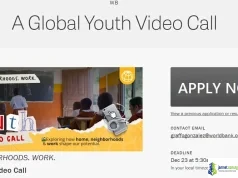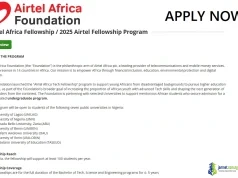The Nigeria Jubilee Fellows Programme 2.0 is a critical national initiative designed to bridge the gap between academic learning and real-world professional practice for high-potential young Nigerian graduates. The program is specifically targeted at fresh graduates, those who obtained a Bachelor’s Degree or Higher National Diploma (HND) no earlier than 2022, who are 30 years old or younger and currently unemployed. Eligibility requires a minimum academic standing of a Second Class Lower (2.2) for degree holders or Upper Credit for HND holders, alongside the completion of the National Youth Service Corps (NYSC) or possession of an exemption certificate. The fellowship provides fellows with employment opportunities, invaluable hands-on experience, and essential mentorship over a structured term.
A key update is the strict outline of technical requirements covering device operating systems, supported browsers, and network stability, underscoring the program’s commitment to modern, digitized operations. The application portal opens on October 22, 2025, at 5:00 PM (WAT), requiring comprehensive documentation including Notarized Degree Certificates, NIN, and BVN.


The Nigeria Jubilee Fellows Programme 2.0 (NJFP) represents a significant commitment by the Nigerian government to empower its youth and address the critical issue of graduate unemployment. This program is not simply a job placement service; it is a transformative fellowship designed to strategically connect high-potential Nigerian graduates with meaningful, real-world work opportunities across the country’s public and private sectors.

Join our Telegram Channel for Instant Scholarship Updates
Whether an applicant is seeking to kickstart a professional trajectory, build valuable industry experience, or make an immediate impact within a chosen field, the NJFP 2.0 is specifically engineered for growth. This is a crucial window of opportunity, and preparation is non-negotiable.
The application portal is scheduled to open on October 22, 2025, at 5:00 PM (WAT). Understanding the benefits, the stringent requirements, and the technical specifications is absolutely essential before the portal goes live. This guide details every facet of the new program to ensure a competitive application.
Benefits of the Fellowship
The fellowship is structured to offer more than just temporary employment; it provides foundational elements that will open doors for successful participants long after the program ends.
Guaranteed Employment Opportunity and Hands-on Experience
The primary benefit of the Nigeria Jubilee Fellows Programme 2.0 is the provision of a structured employment opportunity. This is a defined, time-bound placement that allows the fellow to apply academic knowledge in a practical, high-stakes setting. The program guarantees fellows:
- Immediate Professional Relevance: Placement in a role that directly aligns with the fellow’s academic discipline and stated career interest.
- Skill Application: The chance to move beyond theoretical knowledge to executing tasks, managing responsibilities, and contributing tangibly to the host organization’s objectives. This hands-on experience is paramount for bridging the skills gap often cited in African labor markets.
Mentorship and Professional Support Systems
A critical, long-lasting component of the NJFP 2.0 is the establishment of robust mentorship and support systems. Participants are not left to navigate the professional world alone; instead, they are paired with experienced industry veterans who offer guidance, insight, and networking opportunities.
- Career Guidance: Mentors provide tailored advice on long-term career planning, specialization, and navigating workplace challenges.
- Networking: The network built during the fellowship—through mentors, cohort colleagues, and host organizations—is invaluable. These connections often open doors long after the fellowship ends, providing future employment leads and professional partnerships.
- Skill Refinement: Support systems frequently include workshops on soft skills such as professional writing, presentation delivery, and ethical workplace conduct, which are vital for sustained career success.
Essential Eligibility and Program Requirements for the NJFP 2.0 application
The requirements for the Nigeria Jubilee Fellows Programme 2.0 are clearly defined and must be met exactly. These criteria are designed to target young, high-potential individuals at the crucial starting phase of their professional careers.
Citizenship, Age, and Employment Status
- Nigerian Citizen: Applicants must be Nigerian citizens.
- Age Limit: Applicants must be 30 years old or younger at the time of the application deadline. This ensures the program targets the demographic most in need of foundational career support.
- Employment Status: Applicants must not currently be engaged in any employment. The program is intended to give a career start to unemployed graduates, not to transition individuals already in the workforce.
Academic and Graduation Requirements
The NJFP 2.0 is specific about both the graduation timeline and the minimum academic performance.
- Fresh Graduate Status: The applicant must be a fresh graduate holding a Bachelor’s degree or a Higher National Diploma (HND) Certificate. Crucially, the graduation date must not be earlier than 2022. This establishes the “freshness” of the graduate status, ensuring the skills obtained from university are current.
- Academic Standing: Minimum academic qualifications are strictly enforced:
- Bachelor’s Degree: Must have graduated with at least a Second-Class Lower (2.2).
- HND Certificate: Must have graduated with an Upper Credit (which typically corresponds to a cumulative grade point average of greater than 3.00).
The National Youth Service Corps (NYSC) Mandate
The completion of the mandatory National Youth Service Corps (NYSC) is a prerequisite. Applicants must have either:
- Completed the mandatory NYSC and possess the Certificate of National Service.
- Obtained a Certificate of Exemption from the NYSC.
This is a non-negotiable requirement for official placement in many organizations across Nigeria.
Commitment and Professional Attitude
In addition to the technical requirements, the program places a high value on attitude and commitment:
- Career Commitment: Applicants must demonstrate interest and commitment in their chosen career field. This is usually assessed through the CV, the Motivation Letter (which may be requested later in the process), and declared aspirations.
- Socio-Economic Contribution: Applicants must demonstrate interest and commitment to contributing to Nigeria’s socio-economic development. This aligns the fellow’s personal goals with the national developmental mission of the NJFP.
- Professional Skills: Applicants must possess excellent time management and a professional attitude, alongside good verbal and written communication skills.
Technical Requirements: Ensuring Digital Readiness in NJFP 2.0
The inclusion of specific technical requirements in the NJFP 2.0 guidelines underscores the program’s adoption of a modern, digital-first approach to talent deployment and program management. Fellows are expected to be digitally proficient and accessible.
Device Requirements: Mobile-First
Recognizing that over 80% of Nigerian Graduates use mobile devices as their primary computing tool, the program adopts a mobile-first strategy.
| Device Type | Operating System (OS) | RAM Minimum | Storage Minimum | Screen Specification |
|---|---|---|---|---|
| Smartphone | Android 8.0+ or iOS 12+ | Minimum 2GB (4GB recommended) | At least 500MB free space | Minimum 5-inch display, 720p resolution |
| Laptop / Desktop (Optional) | Windows 10+, macOS 10.14+, Linux Ubuntu 18.04+ | 4GB minimum | 10GB free space | Processor: Intel i3 (or equivalent) and above |
The stringent RAM and OS requirements ensure that fellows can run contemporary professional software, video conferencing tools, and the program’s internal management portal efficiently. The laptop/desktop requirement is optional but highly recommended for advanced tasks requiring greater processing power or screen real estate.
Browser, Network, and Security Specifications
Digital access and security are paramount for effective participation in a geographically decentralized program.
- Browser Requirements: The application portal and subsequent program resources mandate the use of modern, secure browsers: Google Chrome (v90+), Mozilla Firefox (v85+), Microsoft Edge (v90+), and Safari (v13+ on iOS/macOS). These versions support the latest web security protocols and performance features.
- Network Requirements: While the program supports various network types, stable access is crucial:
- Primary: 3G / 4G LTE.
- Fully Supported: 5G (where available).
- Basic Features Only: 2G (This allows for text announcements but will likely impede rich media or interactive features).
- Standard: Wi-Fi (institutional or personal hotspots).
- Security & Access Requirements:
- Two-Factor Authentication (2FA): The use of 2FA (via SMS, email, or Authenticator app) is strongly recommended to protect sensitive application and personal data.
- Up-to-Date Patches: Devices must possess up-to-date security patches to mitigate risks from vulnerabilities.
- Shared Devices: Fellows accessing the portal from shared devices (for example, cybercafés) must log out immediately after use to prevent unauthorized access to their personal application records.
Accessibility and Usability Mandate
The program emphasizes Accessibility and Usability, recognizing the diversity of device capabilities across the country. The portal must be mobile-first to cater to the majority of users and will be adapted to function effectively on low-resolution devices.
Application Documents
The application requires specific, legally verifiable documentation to confirm academic and national status. Gathering these documents well before the October 22, 2025 deadline is an urgent priority.
1. Notarized Degree Certificate
This is the official proof of the applicant’s academic qualification (Bachelor’s or HND). The certificate must be notarized, meaning its authenticity is legally certified. This step eliminates fraud and verifies the minimum academic standing (2.2 or Upper Credit).
2. NYSC Certificate
The National Youth Service Corps (NYSC) Certificate or Certificate of Exemption verifies that the applicant has met the national service requirement, which is a key legal and professional prerequisite for employment in Nigeria.
3. Curriculum Vitae (CV)
The CV must be detailed and professionally prepared. It is the primary document used to demonstrate the interest and commitment in the chosen career field and is the first point of assessment for leadership potential and past accomplishments, even if they are non-paid or academic.
4. National Identification Number (NIN) Slip
The National Identification Number (NIN) is the unique identifier issued by the National Identity Management Commission (NIMC). Submitting the NIN Slip is a mandatory step for identity verification and adherence to national digital identity standards.
5. Bank Verification Number (BVN)
The Bank Verification Number (BVN) is a biometric identification system for the Nigerian banking industry. Providing the BVN is necessary to verify the applicant’s banking details and ensure secure, seamless stipend payments during the fellowship.
Critical Application Timeline and Preparation
The most important element for applicants is the application window. The portal opens only for a specified period, and timing is crucial.
- Opening Date and Time: The application portal opens on Wednesday, October 22, 2025, at 5:00 PM (WAT – West Africa Time).
- Preparation: Given the highly competitive nature of the Nigeria Jubilee Fellows Programme 2.0, applicants must have all documents scanned, notarized, and ready for immediate upload. Technical requirements regarding device and network access should be verified before the opening time to prevent last-minute technical delays. It is important that the device has sufficient free storage space and the browser is the correct, updated version.
Success in this program depends not only on meeting the eligibility requirements but also on demonstrating a strong professional attitude and commitment to Nigeria’s development through a well-prepared and timely submission.
CLICK HERE TO APPLY
For more Information Click Here
Frequently Asked Questions (FAQ) About the Nigeria Jubilee Fellows Programme 2.0
Here are ten questions and answers related to the Nigeria Jubilee Fellows Programme 2.0 that applicants frequently search for:
1. Is there an upper limit on the number of years the applicant must have graduated?
Yes. The program is specifically targeted at fresh graduates. Applicants must have obtained their Bachelor’s Degree or HND Certificate not earlier than 2022. This means that graduates from 2022, 2023, 2024, and 2025 are eligible, provided they meet all other criteria.
2. Can I apply if I graduated with a Third Class degree?
No. The academic requirements are strict. For a Bachelor’s Degree, the minimum acceptable grade is a Second-Class Lower (2.2). Graduates with a Third Class degree do not meet this minimum criterion for the Nigeria Jubilee Fellows Programme 2.0.
3. What is the distinction between Upper Credit for HND holders and a Second-Class Lower for degree holders?
These are equivalent minimum standards for admission into the fellowship. Upper Credit is the required minimum classification for the Higher National Diploma (HND), while Second-Class Lower is the required minimum classification for the Bachelor’s Degree. Both standards ensure that fellows possess a sufficient foundation of academic merit.
4. If I currently have a small part-time job or run a personal business, am I eligible?
The requirement states that the applicant must not currently be engaged in any employment. Applicants should carefully consider whether their current engagement constitutes formal employment. The spirit of the rule is to prioritize candidates who are currently unemployed and seeking their primary career launchpad through the Nigeria Jubilee Fellows Programme 2.0.
5. Why is the Bank Verification Number (BVN) a mandatory application document?
The BVN is required to establish the applicant’s identity within the formal financial system and ensure that, upon acceptance into the fellowship, the stipend payments can be made securely and efficiently directly into the fellow’s verified bank account without any intermediaries.
6. Must my Degree Certificate be notarized before the application deadline?
Yes. The requirement specifically asks for a Notarized Degree Certificate. Applicants must complete the notarization process with a Commissioner for Oaths or other recognized legal official well in advance of the October 22, 2025 deadline, as this process can take time.
7. Can I still apply if I only have a 2G network connection available to me?
While the portal supports 2G, it is listed as being suitable for basic features only, such as text announcements. A stable 3G, 4G LTE, or Wi-Fi connection is highly recommended for the initial application submission process, which may involve uploading documents and completing potentially bandwidth-intensive forms.
8. What does “demonstrate interest/commitment in chosen career field” involve in the application?
This usually involves clearly articulating career goals in the CV or a potential motivation statement, and highlighting relevant non-academic experiences, such as internships, volunteer work, or university projects that align directly with the desired professional sector (e.g., engineering, agriculture, or finance).
9. Are there specific academic disciplines that the NJFP 2.0 prioritizes for selection?
The program is open to fresh graduates from any discipline. While specific placements may favor technical or STEM backgrounds, the overall program is designed to connect high-potential graduates from all fields—including arts, humanities, sciences, and business—with work opportunities relevant to their qualifications.
10. Can I still apply if I have not yet collected my NYSC Exemption Certificate, but I am qualified for it?
No. The requirement mandates that you must either have completed the mandatory NYSC or have a certificate of exemption from the NYSC. Documentation must be ready for submission to prove this status at the time of application. Without the physical certificate or exemption letter, the application is likely to be deemed incomplete.













